Related Research Articles

The first Wartburg Festival was a convention of about 500 Protestant German students, held on 18 October 1817 at the Wartburg castle near Eisenach in Thuringia. The former refuge of reformer Martin Luther was considered a national symbol and the assembly a protest against reactionary politics and Kleinstaaterei.

The Turkish-Islamic Union for Religious Affairs is one of the largest Islamic organisations in Germany. Founded in 1984 as a branch of the Presidency of Religious Affairs in Ankara, it is an "arm" of the Turkish state. The headquarters are in Cologne-Ehrenfeld.
Germany's Next Topmodel is a German reality television series based on the concept introduced by Tyra Banks with America's Next Top Model. The competition is hosted by Heidi Klum, who also serves as the lead judge and executive producer of the show.
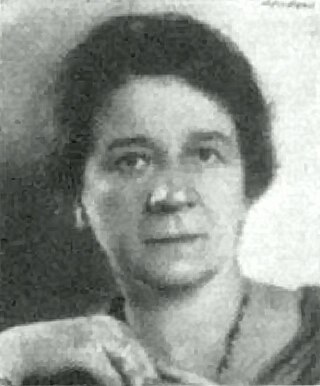
Gertrud Bäumer was a German politician who actively participated in the German civil rights feminist movement. She was also a writer, and contributed to Friedrich Naumann's paper Die Hilfe. From 1898, Bäumer lived and worked together with the German feminist and politician Helene Lange.
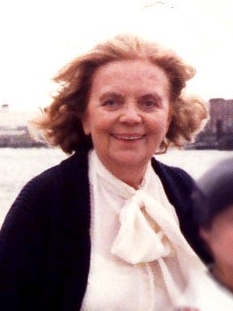
Heidi Bertha Auguste Kabel was a German actress and musician. Most of her stage roles were performed at the Ohnsorg-Theater in Hamburg, many of them in Low German. She became famous in Germany as many of the productions of the Ohnsorg Theater were transmitted on German television.

Necla Kelek is a Turkish-born German feminist and social scientist, holding a doctorate in this field, originally from Turkey. She gave lectures on migration sociology at the Evangelische Fachhochschule für Sozialpädagogik in Hamburg from 1999 until 2004.

Frauke Petry is a German politician who chaired the Alternative for Germany (AfD) party from July 2015 to September 2017. A chemist by training and with a professional background as a businesswoman, some political scientists described Petry as a representative of the national conservative wing of that party.
Arminius is an oratorio by the German composer Max Bruch. Bruch wrote the work between 1875 and 1877 during the consolidation of the newly founded German Empire. He picked the story revolving around Arminius and the Cherusci-led defeat of three Roman legions in the Teutoburg Forest in 9 A.D., which served as a German national myth from the 16th to the early 20th century.
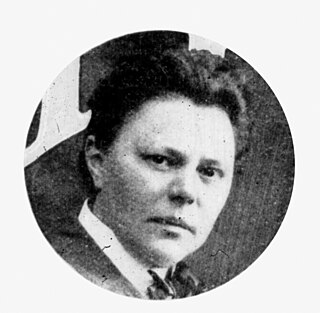
Johanna Elberskirchen was a feminist writer and activist for the rights of women, gays and lesbians as well as blue-collar workers. She published books on women's sexuality and health among other topics. Her last known public appearance was in 1930 in Vienna, where she gave a talk at a conference organised by the World League for Sexual Reform. She was open about her own homosexuality which made her a somewhat exceptional figure in the feminist movement of her time. Her career as an activist was ended in 1933, when the Nazi Party rose to power. There is no public record of a funeral but witnesses report that Elberskirchen's urn was secretly put into the grave of Hildegard Moniac, who had been her life partner.
Elham Manea is a Swiss-Yemeni writer, professor, and human rights advocate. She is known for her human rights advocacy, especially for her defence of women's rights, freedom of expression, freedom of/from religion, minority and LGBT rights in the Arab and Islamic world (s). She has participated in several human rights campaigns in the MENA region and is considered part of the Islamic feminist movement that insists on the possibility of gender equality in Muslim majority countries. She has led mixed prayers in London, Bern, Berlin, Cape Town and Oxford in cooperation with inclusive mosques and open mosques initiatives.
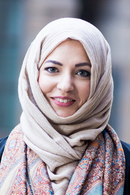
Khola Maryam Hübsch is a German journalist and writer of German-Indian origin. Hübsch is the daughter of the German writer Hadayatullah Hübsch. She is a prominent member of the Ahmadiyya Muslim Community of Germany.

Ismail Tipi was a German politician (CDU) and member of the Hessian parliament.

Sawsan Mohammed Chebli is an Arab politician of the Social Democratic Party (SPD).

The Ibn Rushd-Goethe Mosque is the only self-described liberal mosque in Germany. It was inaugurated in June 2017, and is named after medieval Andalusian-Arabic polymath Ibn Rushd and German writer and statesman Johann Wolfgang von Goethe. The mosque was founded by Seyran Ateş, a German lawyer and Muslim feminist of Kurdish descent. The mosque is characterised as liberal; it bans face-covering, it allows women and men to pray together, and it accepts LGBT worshippers.

Dagmar Enkelmann is a German politician of Die Linke party.
Brigitte Blobel was a German novel writer and screenplay writer from Hamburg. A prolific writer of German books, she is known for writing the Neues vom Süderhof books, on which the TV show was based.
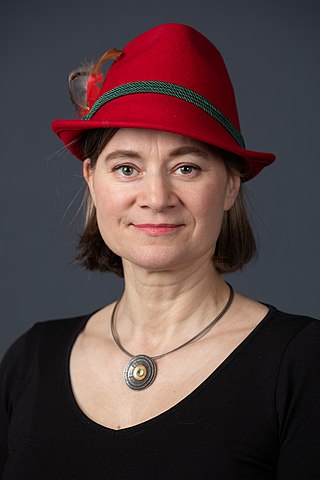
Anke Domscheit-Berg is a German politician and activist. She has been a member of the Bundestag since 2017, when she was elected on the party list of The Left, without being a party member. She joined the party in 2021 following her nomination to the top female position on the party election list in the state of Brandenburg. Previously, she was a member of the Pirate Party Germany and the Greens. She is married to Daniel Domscheit-Berg. In 2010 she received the Berliner Frauenpreis.

Franziska Becker is a German cartoonist.
ʽAlī ibn Muḥammad ibn al-Riḍā ibn Muḥammad al-Ḥusaynī al-Musāwī al-Ṭūsī, also known as Ibn al-Sharīf Dartarkhwān al-ʽĀdhilī, was a poet. He is noted as the author of the Alf jāriyah wa-jāriyah, which survives in one manuscript of 255 folios, now in the Austrian National Library. The work seems to have been a sequel to the same author's Alf ghulām wa-ghulām, now lost; Alf jāriyah wa-jāriyah comprises eight chapters of short poems in the epigrammatic form known as maqṭūʽ.

Gisela Erler is a German researcher, feminist, entrepreneur and politician, who is a member of the Green Party. She is credited with playing a role in the development of family benefits in Germany, such as parental allowance and the right to a day-care place for children. From 2011 to 2021 she was a member of the state government of Baden-Württemberg, with responsibility for "Civil Society and Citizen Participation".
References
- ↑ ""Der Islam hat nichts mit Terror zu tun? Absurd"". 1 April 2016.
- ↑ Vogel, Mathis (January 1, 2015). "Zana Ramadani: Die Bloßstellung" [Zana Ramadani: The exposure]. Die Zeit (in German). Germany. Retrieved April 20, 2017.
- ↑ "Rel rond blote borsten van Duitse politica" – via www.youtube.com.
- ↑ Ramadani, Zana (March 3, 2017). Die verschleierte Gefahr: Die Macht der muslimischen Mütter und der Toleranzwahn der Deutschen. Munich: Europa Verlag. ISBN 978-3-95890-077-6.
- ↑ ARD report: http://info.arte.tv/de/zana-ramadani-die-verschleierte-gefahr
- ↑ "Zana Ramadani glaubt, das Problem muslimischer Männer zu kennen" [Zana Ramadani believes she knows the problem with Muslim men]. Die Welt (in German). Germany. April 10, 2017. Retrieved April 20, 2017.
- ↑ "Muslim-Mütter erziehen Söhne zu Versagern". 20 Minuten . Retrieved 2017-07-25.
- ↑ Weber, Interview von Bettina (2017-04-09). "Muslimische Mütter erziehen ihre Söhne zu Versagern". sueddeutsche.de (in German). ISSN 0174-4917 . Retrieved 2017-07-19.